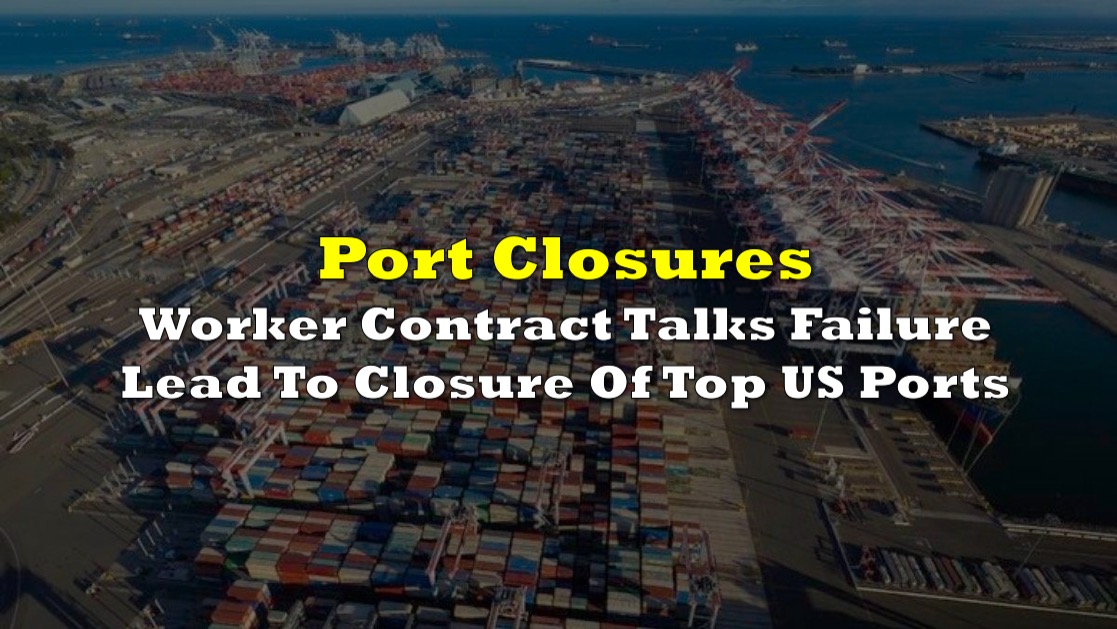After months of tense labor negotiations between union dock workers and their employers, a scarcity of West Coast port workers prompted the main U.S. ocean trade gateway to largely close on Friday.
According to the Pacific Maritime Association (PMA), which represents businesses, a significant number of workers at the ports of Los Angeles and Long Beach, including operators needed to load and unload cargo, failed to show up on the job beginning Thursday evening.
“Four of the Port’s container terminals are closed for the day, today, April 7. Terminal operators at the affected sites said they made the decision to close when workers did not report for their shifts this morning. We have no further information as to the situation, but it is expected that normal, regularly scheduled hours and operations will resume tomorrow,” Port of Long Beach Executive Director Mario Cordero said in a statement.
The PMA said the missing workers are the consequence of a concerted strike by the International Longshore and Warehouse Union (ILWU) to withhold labor as contract negotiations continue.
“The action by the union has effectively shut down the ports of Los Angeles and Long Beach,” the PMA said in a statement.
Instead, the ILWU said that the slowdown was caused by thousands of union workers attending a monthly membership gathering on Thursday evening and then taking the Good Friday holiday the next day.
“On Friday, April 7, 2023, union members who observe religious holidays took the opportunity to celebrate with their families,” read a statement from ILWU. “Cargo operations are ongoing as longshore workers at the Ports remain on the job.”
When workers did not show up at the Port of Long Beach on Friday morning, operators chose to temporarily close four of the seaport’s six terminals, according to port spokesman Lee Peterson, adding that regular operations at the harbor were anticipated to resume on Saturday.
The Port of Los Angeles was working with the ILWU and PMA, as well as federal, state, and local officials, to “support a return to normal operations,” according to the group, which is controlled by a city entity.
LA Port shut down. Good grief pic.twitter.com/pbaGvbVzDl
— Chessie1207 (@Chessie12071) April 9, 2023
However, it seems dockworkers returned to container terminals for the Friday evening shift, restoring normal operations at the Ports of Los Angeles and Long Beach.
“It’s a go,” said Alan McCorkle, chief executive officer of Yusen Terminals LLC at the Port of Los Angeles. “Labor is showing up.”
Due to low quantities, the impact of the closures on freight movement was believed to be limited.
Call to Biden
The stoppage comes after 238 business organizations urged President Joe Biden weeks ago to interfere in the ongoing contract negotiations between the PMA and the ILWU, fearing a possible strike or lockout.
Almost 22,000 dockworkers at 29 West Coast ports have been without a contract for more than ten months. Despite the fact that the contract expired in July, the ILWU has yet to hold a single strike authorization vote.
In preparation of the chance that a strike may occur despite the ILWU bureaucracy’s best efforts, big firms have begun diverting cargo deliveries to other East Coast ports in an attempt to avoid the consequences of a potential strike or lockout.
“As we have witnessed, significant cargo flows have shifted away from the West Coast ports because of the uncertainty related to the labor negotiations,” the letter stated. “Many cargo interests have expressly stated that they shifted cargo as a result of the negotiations. That cargo will not return to the West Coast until after a contract is final and approved by both parties.
The restrictions come as cargo volumes have already decreased from a peak set a year ago. The two ports handle over 40% of all foreign commodities entering in the United States.

The drop in trade volumes has had a significant impact on thousands of dockworkers who have been unable to find steady work, particularly casuals or part-time workers who are promised no benefits, hours, or union representation.
Information for this story was found via Reuters, Bloomberg, ABC, wsws.org, and the sources mentioned. The author has no securities or affiliations related to the organizations discussed. Not a recommendation to buy or sell. Always do additional research and consult a professional before purchasing a security. The author holds no licenses.




